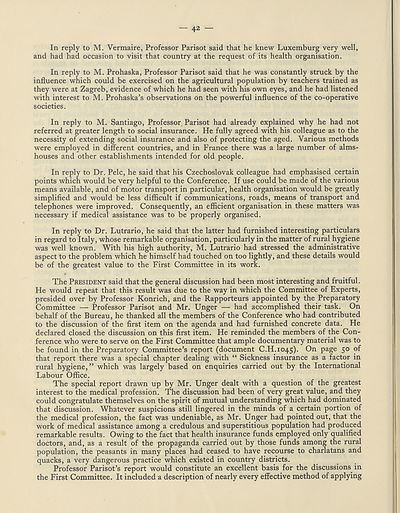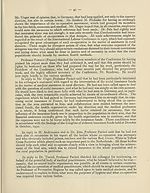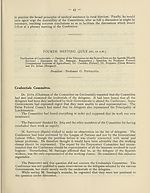Download files
Complete book:
Individual page:
Thumbnail gallery: Grid view | List view

42
In reply to M. Vermaire, Professor Parisot said that he knew Luxemburg very well,
and had had occasion to visit that country at the request of its health organisation.
In reply to M. Prohaska, Professor Parisot said that he was constantly struck by the
influence which could be exercised on the agricultural population by teachers trained as
they were at Zagreb, evidence of which he had seen with his own eyes, and he had listened
with interest to M. Prohaska’s observations on the powerful influence of the co-operative
societies.
In reply to M. Santiago, Professor Parisot had already explained why he had not
referred at greater length to social insurance. He fully agreed with his colleague as to the
necessity of extending social insurance and also of protecting the aged. Various methods
were employed in different countries, and in France there was a large number of alms¬
houses and other establishments intended for old people.
In reply to Dr. Pelc, he said that his Czechoslovak colleague had emphasised certain
points which would be very helpful to the Conference. If use could be made of the various
means available, and of motor transport in particular, health organisation would be greatly
simplified and would be less difficult if communications, roads, means of transport and
telephones were improved. Consequently, an efficient organisation in these matters was
necessary if medical assistance was to be properly organised.
In reply to Dr. Lutrario, he said that the latter had furnished interesting particulars
in regard to Italy, whose remarkable organisation, particularly in the matter of rural hygiene
was well known. With his high authority, M. Lutrario had stressed the administrative
aspect to the problem which he himself had touched on too lightly, and these details would
be of the greatest value to the First Committee in its work.
The President said that the general discussion had been most interesting and fruitful.
He would repeat that this result was due to the way in which the Committee of Experts,
presided over by Professor Konrich, and the Rapporteurs appointed by the Preparatory
Committee — Professor Parisot and Mr. Unger — had accomplished their task. On
behalf of the Bureau, he thanked all the members of the Conference who had contributed
to the discussion of the first item on the agenda and had furnished concrete data. He
declared closed the discussion on this first item. He reminded the members of the Con¬
ference who were to serve on the First Committee that ample documentary material was to
be found in the Preparatory Committee’s report (document C.H.1045). On page 50 of
that report there was a special chapter dealing with “ Sickness insurance as a factor in
rural hygiene,” which was largely based on enquiries carried out by the International
Labour Office.
The special report drawn up by Mr. Unger dealt with a question of the greatest
interest to the medical profession. The discussion had been of very great value, and they
could congratulate themselves on the spirit of mutual understanding which had dominated
that discussion. Whatever suspicions still lingered in the minds of a certain portion of
the medical profession, the fact was undeniable, as Mr. Unger had pointed out, that the
work of medical assistance among a credulous and superstitious population had produced
remarkable results. Owing to the fact that health insurance funds employed only qualified
doctors, and, as a result of the propaganda carried out by those funds among the rural
population, the peasants in many places had ceased to have recourse to charlatans and
quacks, a very dangerous practice which existed in country districts.
Professor Parisot’s report would constitute an excellent basis for the discussions in
the First Committee. It included a description of nearly every effective method of applying
In reply to M. Vermaire, Professor Parisot said that he knew Luxemburg very well,
and had had occasion to visit that country at the request of its health organisation.
In reply to M. Prohaska, Professor Parisot said that he was constantly struck by the
influence which could be exercised on the agricultural population by teachers trained as
they were at Zagreb, evidence of which he had seen with his own eyes, and he had listened
with interest to M. Prohaska’s observations on the powerful influence of the co-operative
societies.
In reply to M. Santiago, Professor Parisot had already explained why he had not
referred at greater length to social insurance. He fully agreed with his colleague as to the
necessity of extending social insurance and also of protecting the aged. Various methods
were employed in different countries, and in France there was a large number of alms¬
houses and other establishments intended for old people.
In reply to Dr. Pelc, he said that his Czechoslovak colleague had emphasised certain
points which would be very helpful to the Conference. If use could be made of the various
means available, and of motor transport in particular, health organisation would be greatly
simplified and would be less difficult if communications, roads, means of transport and
telephones were improved. Consequently, an efficient organisation in these matters was
necessary if medical assistance was to be properly organised.
In reply to Dr. Lutrario, he said that the latter had furnished interesting particulars
in regard to Italy, whose remarkable organisation, particularly in the matter of rural hygiene
was well known. With his high authority, M. Lutrario had stressed the administrative
aspect to the problem which he himself had touched on too lightly, and these details would
be of the greatest value to the First Committee in its work.
The President said that the general discussion had been most interesting and fruitful.
He would repeat that this result was due to the way in which the Committee of Experts,
presided over by Professor Konrich, and the Rapporteurs appointed by the Preparatory
Committee — Professor Parisot and Mr. Unger — had accomplished their task. On
behalf of the Bureau, he thanked all the members of the Conference who had contributed
to the discussion of the first item on the agenda and had furnished concrete data. He
declared closed the discussion on this first item. He reminded the members of the Con¬
ference who were to serve on the First Committee that ample documentary material was to
be found in the Preparatory Committee’s report (document C.H.1045). On page 50 of
that report there was a special chapter dealing with “ Sickness insurance as a factor in
rural hygiene,” which was largely based on enquiries carried out by the International
Labour Office.
The special report drawn up by Mr. Unger dealt with a question of the greatest
interest to the medical profession. The discussion had been of very great value, and they
could congratulate themselves on the spirit of mutual understanding which had dominated
that discussion. Whatever suspicions still lingered in the minds of a certain portion of
the medical profession, the fact was undeniable, as Mr. Unger had pointed out, that the
work of medical assistance among a credulous and superstitious population had produced
remarkable results. Owing to the fact that health insurance funds employed only qualified
doctors, and, as a result of the propaganda carried out by those funds among the rural
population, the peasants in many places had ceased to have recourse to charlatans and
quacks, a very dangerous practice which existed in country districts.
Professor Parisot’s report would constitute an excellent basis for the discussions in
the First Committee. It included a description of nearly every effective method of applying
Set display mode to:
![]() Universal Viewer |
Universal Viewer | ![]() Mirador |
Large image | Transcription
Mirador |
Large image | Transcription
Images and transcriptions on this page, including medium image downloads, may be used under the Creative Commons Attribution 4.0 International Licence unless otherwise stated. ![]()
| League of Nations > Health > European conference on rural hygiene (June 29th-July 7th, 1931) > (44) |
|---|
| Permanent URL | https://digital.nls.uk/190662409 |
|---|
| Shelfmark | LN.III |
|---|---|
| Description | Over 1,200 documents from the non-political organs of the League of Nations that dealt with health, disarmament, economic and financial matters for the duration of the League (1919-1945). Also online are statistical bulletins, essential facts, and an overview of the League by the first Secretary General, Sir Eric Drummond. These items are part of the Official Publications collection at the National Library of Scotland. |
|---|---|
| Additional NLS resources: |
|

